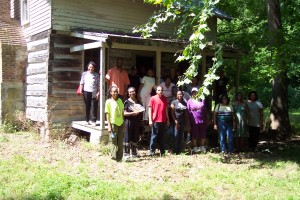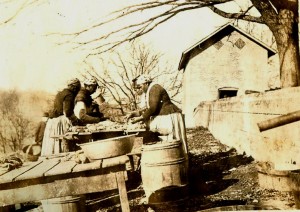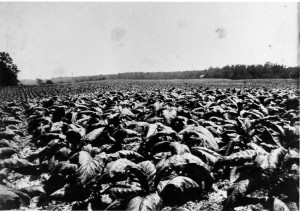On July 11th Nashville Public Television aired its documentary Wessyngton Plantation: A Family’s Road to Freedom. The film was inspired by my book The Washingtons of Wessyngton Plantation: Stories of My Family’s Journey to Freedom and the Tennessee State Museum exhibition Slaves and Slaveholders of Wessyngton Plantation. The documentary highlighted the life of my great-great-great-grandmother Jenny Blow Washington. Jenny along with her sister Sarah was brought from Sussex County, Virginia to Tennessee in 1802 by Joseph Washington who founded Wessyngton Plantation. Jenny married Godfrey a slave from a neighboring plantation and became the matriarch of one of the largest families on Wessyngton. Godfrey and Jenny later had nine children, including my great-great-grandfather Emanuel Washington (1824-1907). Today there are thousands of their descendants throughout the United States. Click link to view the documentary: http://www.youtube.com/watch?v=bdce9dud1c0
Posts Tagged ‘Slave Labor’
WESSYNGTON PLANTATION: A FAMILY’S ROAD TO FREEDOM
Saturday, July 12th, 2014National Black Arts Festival Study Group Walks in Footsteps of Baker’s Ancestors on Wessyngton Plantation
Sunday, June 13th, 2010
In addition to touring the grounds surrounding the Wessyngton mansion, National Black Arts Festival members and guests walked in the footsteps of Baker’s ancestor in the slave cabin area of the plantation. The group went inside a restored slave cabin built ca. 1830. In 1860, there were 274 enslaved African Americans on the plantation, housed in forty log cabins. At the onset of the Civil War, Wessyngton held the largest African American population in the state of Tennessee and was the largest tobacco producer in America.
Slave Women on Southern Plantations
Friday, October 9th, 2009Enslaved African American women performed various task on southern plantations and farms. Women on Wessyngton Plantation were not required to do any hard labor in the fields as the men did; however, they were an important part of other operations on the plantation. Women did light work in the gardens, they knitted and sewed for the slave community and their owners, worked the looms, and did the spinning and weaving. They were responsible for cooking, cleaning, washing, ironing, making cheese, preserves, and soap. No mother with a young baby was expected to do any outside work until her baby was two years old. There was a nursery on the plantation were children were cared for by elderly women too old to work. Women were a vital part of the pork processing industry on the plantation as seen in the photo above. Each week the women on the plantation would assemble at the plantation smokehouse (building in background of photo) and would be allotted bacon, meal, flour, sugar, and coffee based on the number of individuals in their families. Hundreds of hogs were killed at each year at Wessyngton to feed the enslaved population and the Washington family. Wessyngton had a reputation for producing its famous Washington Hams which could be found on the menus of the finest restaurants as far south as New Orleans and as far north as Philadelphia.
Slave Labor on Southern Plantations
Wednesday, October 7th, 2009
Slaves toiled endlessly, clearing land, plowing fields, raising livestock, erecting buildings, and planting crops to transform frontier landscapes into lavish plantations.
The enslaved population on Wessyngton Plantation primarily produced tobacco, which was very labor intensive. In 1860, 250,000 pounds of tobacco was produced on Wessyngton making it the largest producer of tobacco in the United States and the second largest in the world.

